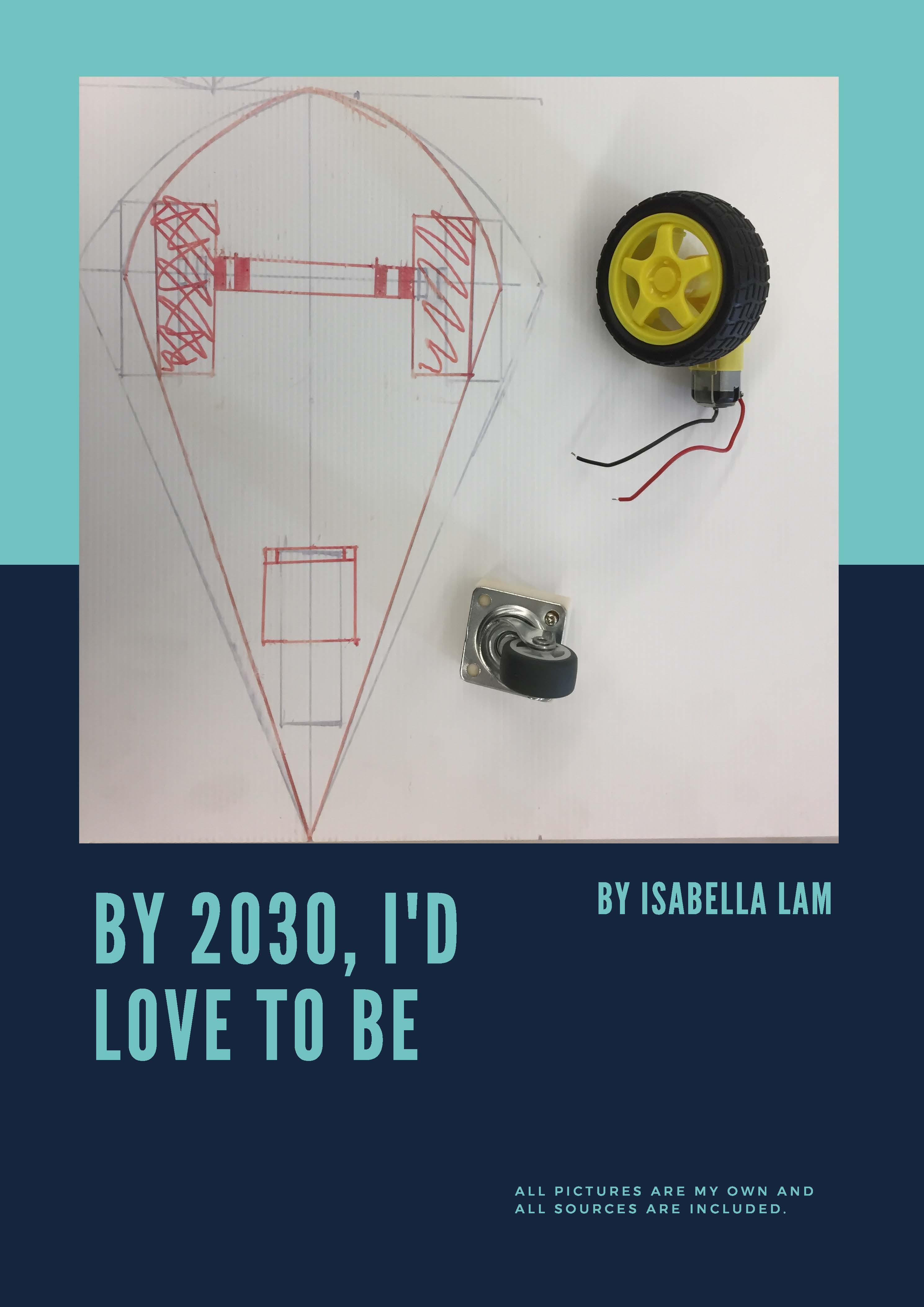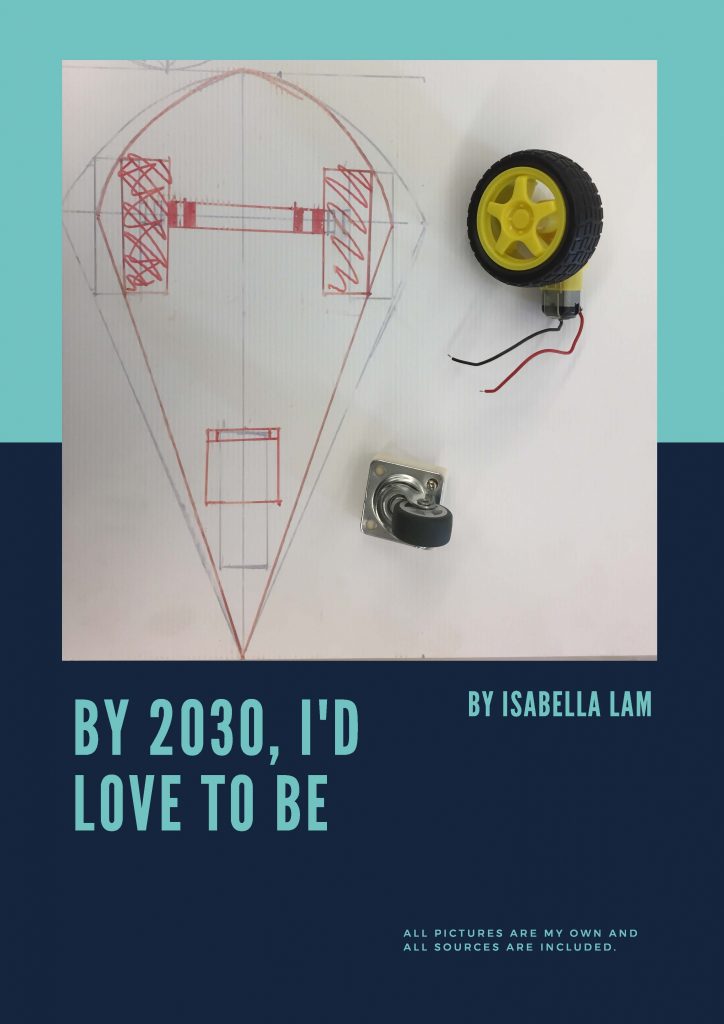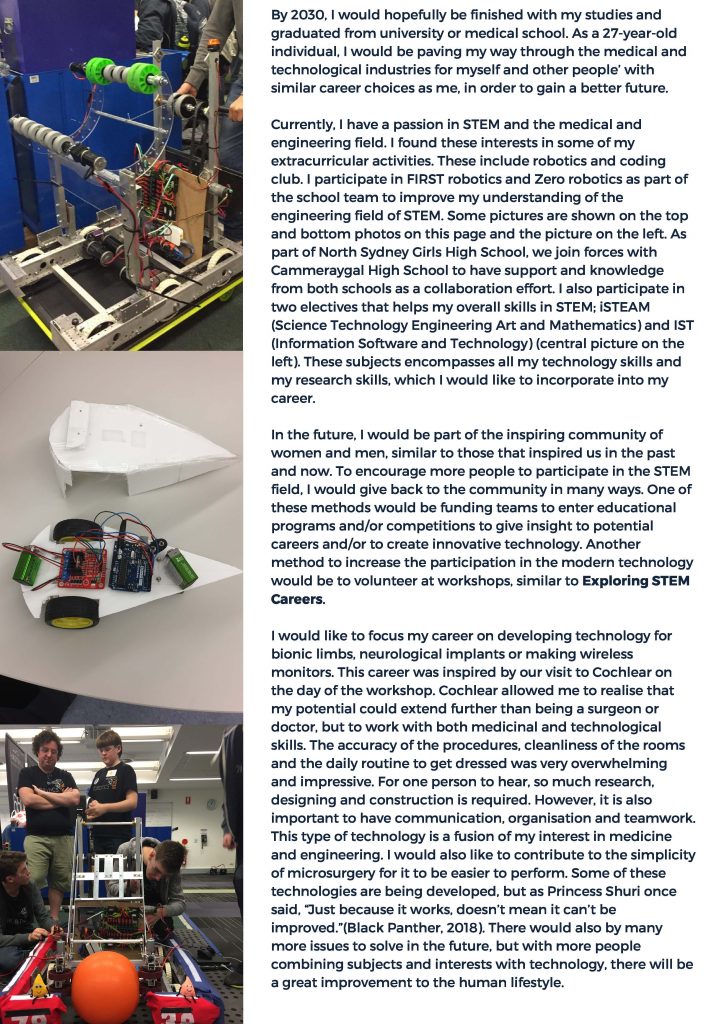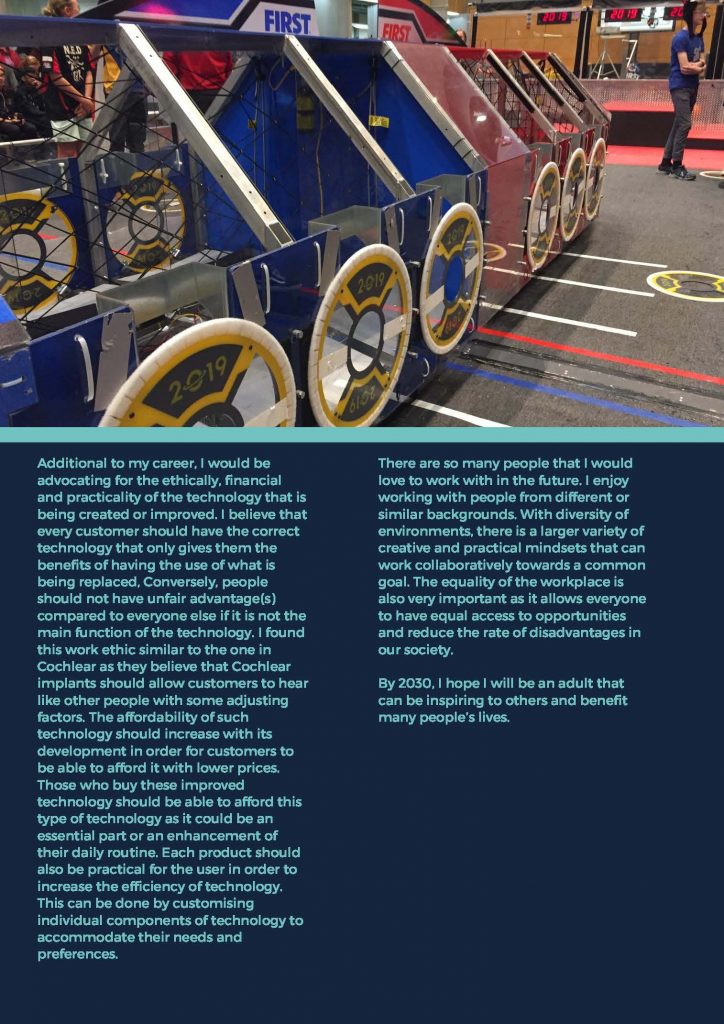By Izzy Heslop
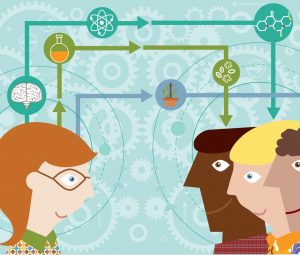 Ever since I was first asked the question ‘What do you want to do in the future?’, there has been one response that has stood out prominently in my brain. Every career aspiration I’ve ever had, each goal and dream, has been fuelled by my desire to improve the lives of as many people as I can. That is why the primary goal I wish to accomplish by 2030 is to have achieved something that will change people’s lives, and possibly even the world, forever. I believe there is no better way to accomplish this than through STEM, a subject that is constantly evolving our perceptions, assisting us in understanding the universe, and using this knowledge to enrich our lives. So, by 2030, I hope to be contributing to this subject in my chosen field of science, while creating connections with creative and inspiring people, and learning as much new information as possible, to make a positive impact on both Earth and humanity. One scientific discipline I specifically wish to positively impact by 2030 is the field of neuroscience. This aspiration was evoked during a year 7 science assessment task in which I was required to research a career within science, and I investigated the path of a clinical neuropsychologist. There is so much to learn about our brains, the complex structures that have aided us in our evolution, and form who we are as individuals. This includes topics such as what constitutes ‘the self’, the extent of neuroplasticity, and the neuroscience of free will, to name a few avenues of discovery I find particularly interesting. I believe that fulfilling this is vital as beings who are conscious not only of our existence but also (somewhat) to the remarkable grandeur of the universe. Not only does this subject satisfy my desire to understand, but it also provides the opportunity to benefit people suffering disorders and diseases of the brain.
Ever since I was first asked the question ‘What do you want to do in the future?’, there has been one response that has stood out prominently in my brain. Every career aspiration I’ve ever had, each goal and dream, has been fuelled by my desire to improve the lives of as many people as I can. That is why the primary goal I wish to accomplish by 2030 is to have achieved something that will change people’s lives, and possibly even the world, forever. I believe there is no better way to accomplish this than through STEM, a subject that is constantly evolving our perceptions, assisting us in understanding the universe, and using this knowledge to enrich our lives. So, by 2030, I hope to be contributing to this subject in my chosen field of science, while creating connections with creative and inspiring people, and learning as much new information as possible, to make a positive impact on both Earth and humanity. One scientific discipline I specifically wish to positively impact by 2030 is the field of neuroscience. This aspiration was evoked during a year 7 science assessment task in which I was required to research a career within science, and I investigated the path of a clinical neuropsychologist. There is so much to learn about our brains, the complex structures that have aided us in our evolution, and form who we are as individuals. This includes topics such as what constitutes ‘the self’, the extent of neuroplasticity, and the neuroscience of free will, to name a few avenues of discovery I find particularly interesting. I believe that fulfilling this is vital as beings who are conscious not only of our existence but also (somewhat) to the remarkable grandeur of the universe. Not only does this subject satisfy my desire to understand, but it also provides the opportunity to benefit people suffering disorders and diseases of the brain.
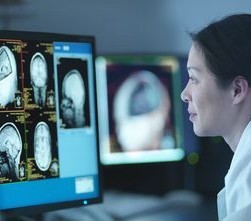
Specifically, the Australian Story Documentary ‘The Enemy Within’, which follows the story of neuroscientist Justin Yerbury, living with Motor Neuron Disease, inspired me to contribute to making a change in the lives of individuals suffering from such conditions. That is why I hope to, by 2030, be part of the discovery for a treatment, or even a cure, for sufferers of brain complications, impacting these people forever.
While I am incredibly determined to make discoveries as a neuroscientist that will contribute positively to people’s lives, I understand that this is not a possible task without the assistance of others. That is why, by 2030, I strive to interact with people who share the same passion for STEM, improving the world, and expanding their knowledge. It is incredibly challenging, especially living in a rural area, to find others of my age with similar aspirations, and I aim to connect with other people who have these traits and to whom I can in turn relate. This is not only something I desire but is also a vital factor in STEM, as exchanging information is incredibly important in continuously developing improved technologies. This could include meeting scientists all over the world and simply establishing strong connections with various people in my future work environment. Attending the ‘Exploring STEM Careers’ day with UNSW was incredibly beneficial in this regard, as it allowed me to form connections with girls interested in pursuing a career in STEM, as well as women who had already taken this path.
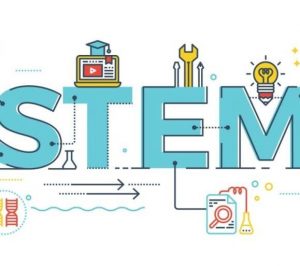
While this is very challenging being an introvert with social anxiety, I believe it is incredibly important, and I, therefore, aim to develop beyond my comfort zone in this regard by 2030.
Finally, an important aspect of creating change is to be knowledgeable, as it is essential to be educated on recent research, ideas, and concepts, to create additional personal developments in science. Therefore, both before and after 2030, I aim to exercise every opportunity to gain as much knowledge as I possibly can. My attendance at the ‘Exploring STEM Careers’ program was an illustration of how I am striving to achieve this, and I believe it was incredibly beneficial for the extension of my knowledge. By 2030, I hope I can honestly say that I have proceeded to take every opportunity to learn that I possibly can.
In conclusion, by 2030, I would like to have achieved something in my career that improves numerous lives, and possibly even the entire world. Despite my plans, with the current speed of continuous advancements within STEM, this may result in me researching something that hasn’t even been thought of yet, or working in a job that doesn’t exist today. Therefore, I hope in the future that, whatever I may be doing, I will be staying curious, making a difference, and enjoying the path that is taking me towards 2030.

Photos sourced from: (1) Teacher Magazine, (2) Scientific American, (3) Purdue University, and (4) Cognosco Learning


